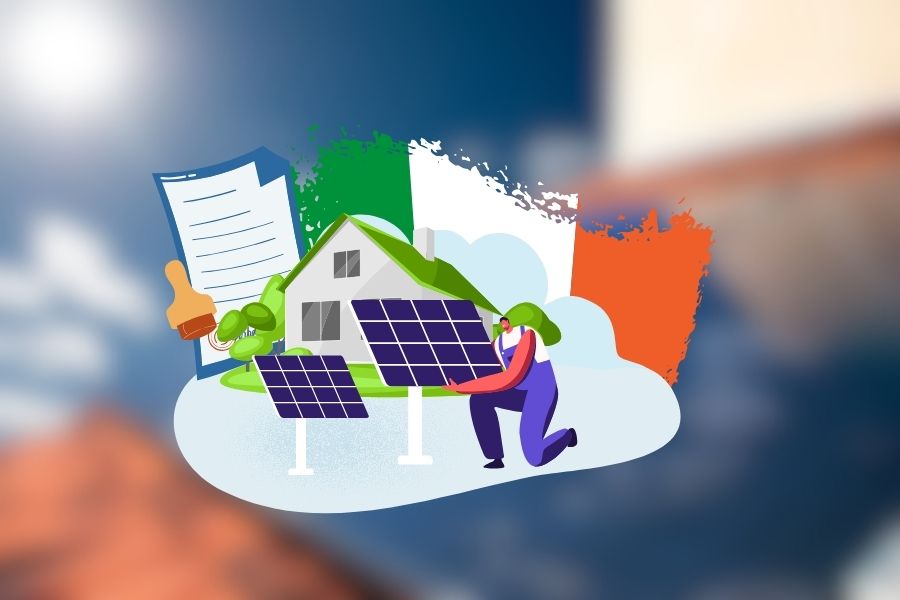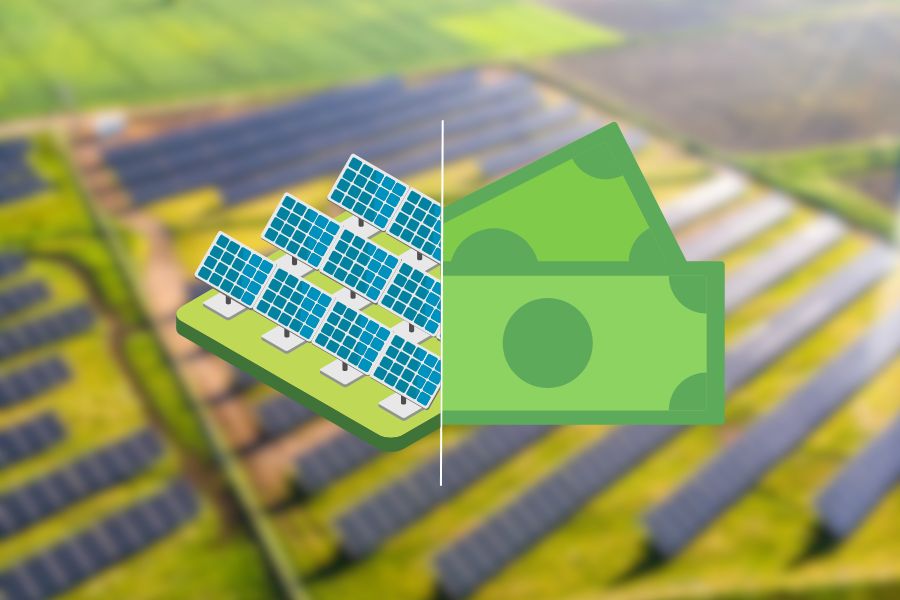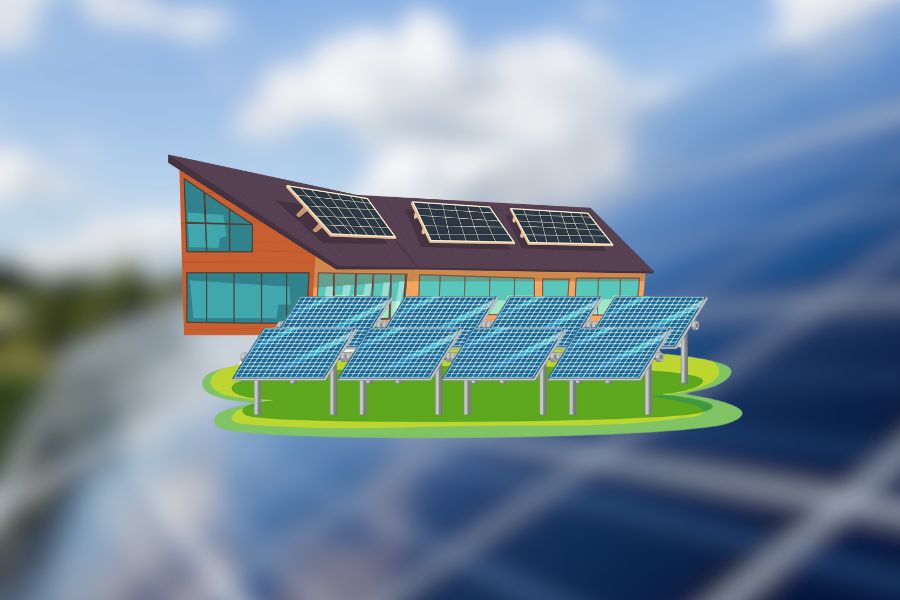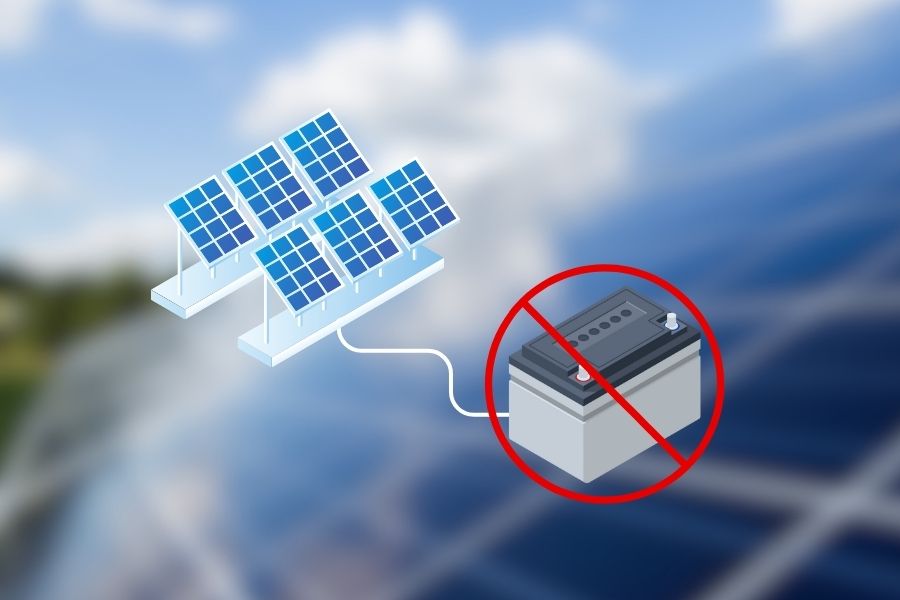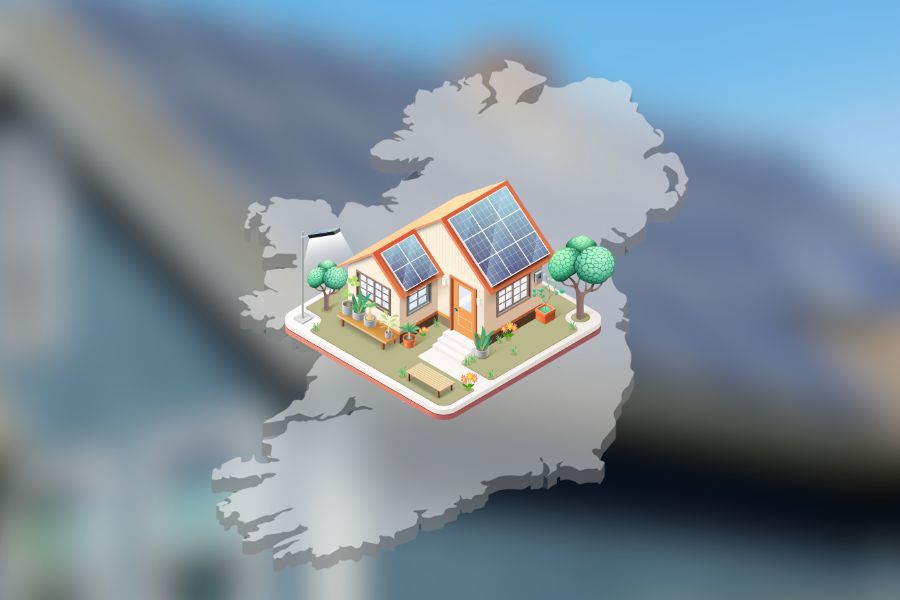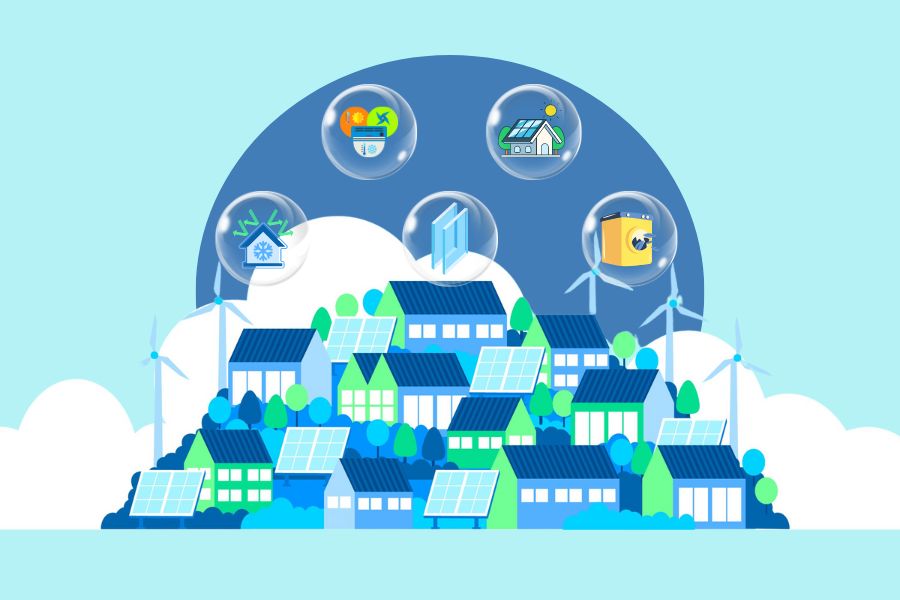In Ireland, you can legally install solar panels yourself. However, It’s more complicated because safety rules often require a certified electrician to make the final connections. Also, DIY installations may affect your eligibility for specific grants and warranties, which usually require a professional setup. Therefore, weighing these considerations is crucial when deciding between a self-installation or professional service.
Can I Install Solar Panels Myself in Ireland?
Yes, in Ireland, you can technically install solar panels as legally permitted. But remember, the solar panel system installation process can be complex. When planning your installation, it’s critical to understand the requirements for planning permission for solar panels in Ireland.
Again, due to safety regulations, you’ll often need a certified electrician to handle the final electrical connections. Plus, doing it yourself might affect your eligibility for the solar electricity grant and warranties requiring professional installation. So, while self-installation is possible, you’ll need to weigh these considerations carefully.
Legal Considerations for Installing Solar Panels in Ireland
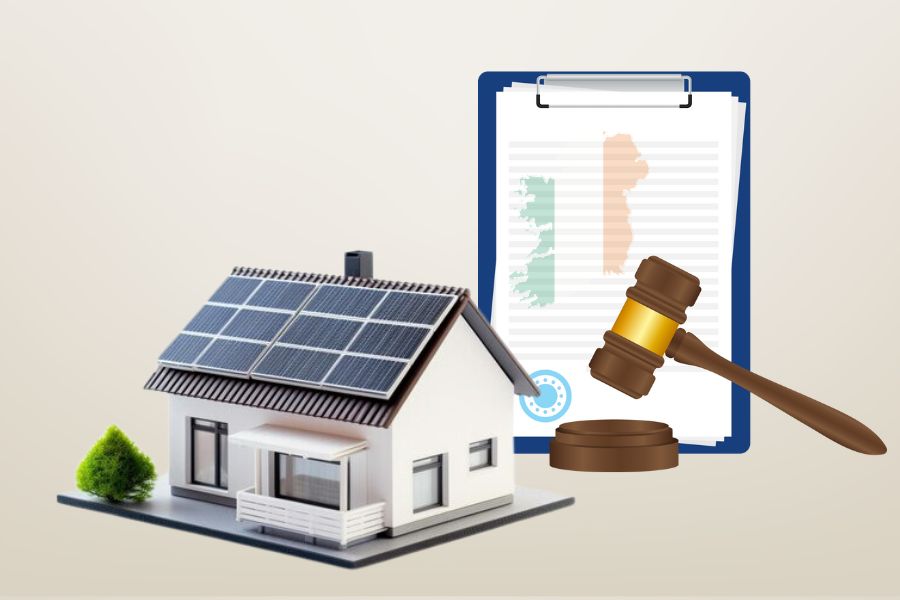
When installing solar panels in Ireland, there are some vital legal aspects you should be aware of. For starters, you can only go so far while you’re allowed to participate in the setup. You can lay the cable runs in place loosely and mount the inverter to the wall.
However, the actual electrical connections have to be done by a qualified electrician. This requirement is in the National Rules for Electrical Installations, which provide a comprehensive guide on conducting such tasks legally.
After your solar power system installation, there’s some paperwork. The electrician who completed the work must notify ESB Networks of the installation. One does it by submitting a specific form known as NC6.
There are also essential requirements around the equipment you use. The inverter, a key component of your solar system, has to conform to the IS EN 50549-1 standard. Remember, you’ll need documents to prove it meets this standard. Moreover, all the hardware involved in your installation must be CE marked, showing that it complies with the relevant EU safety, health, and environmental requirements. Also, all components should meet the National Rules for Electrical Installations guidelines.
You’ll need to follow the planning permission exemption rules. Even though exemptions often get solar panel grants, conditions are attached. A key one to remember is that panel installation should be at least 50 cm from the edges of your roof.
Pros and Cons of DIY Solar Panels in Ireland
Pros
- Cost Savings: One significant benefit of installing solar panels yourself is the potential for cost savings. By taking on the labor of solar panels installed, you can cut down on the expenses associated with professional installation. Besides, that makes your switch to renewable energy more economical.
- Educational: Installing your solar panels can be an enriching experience. It gives you a hands-on understanding of sustainable energy systems, teaching you how to harness and utilize solar energy practically.
- Flexibility: DIY solar panel installation gives you more control over the timeline of your project. You can install unlimited solar panels at your own pace and convenience, offering greater flexibility.
Cons
- Safety and Complexity: Solar safeguarding zones are essential to consider. Solar panel installation involves working with electricity, which can be risky if not handled correctly. In Ireland, a certified electrician must make the final electrical connections for the solar system, ensuring safety and adherence to regulations.
- Warranty Concerns: DIY installation might void warranties on the solar equipment. Should there be issues in the future that require repairs or replacements, a voided warranty could lead to additional costs and complications.
- Grant Eligibility: The Sustainable Energy Authority in Ireland offers specific grants for installing solar panels. However, DIY installations may not qualify as these typically require professional installation as proof of adherence to the required standards.
- Regulatory Compliance: Installing solar panels requires compliance with local and national regulations. Moreover, this includes notifying ESB Networks of the installation and ensuring that all equipment meets specific standards. It might be easier for a DIY enthusiast to navigate all these regulations with professional help.
How Much Do DIY Solar Panels Cost in Ireland?
If you have the skills to construct your panels, a DIY solar panel installation can be a viable option in Ireland. The cost for such a project typically ranges between €5,000 and €15,000 for residential homes. The final price can vary based on the size and specifics of the solar PV system you’re installing, among other factors.
Keep in mind even if you’re going the DIY route, you might need to account for potential additional costs, such as certified electricians for certain parts of the installation as per local regulations.
Do You Need Planning Permission for Solar Panels in Ireland?
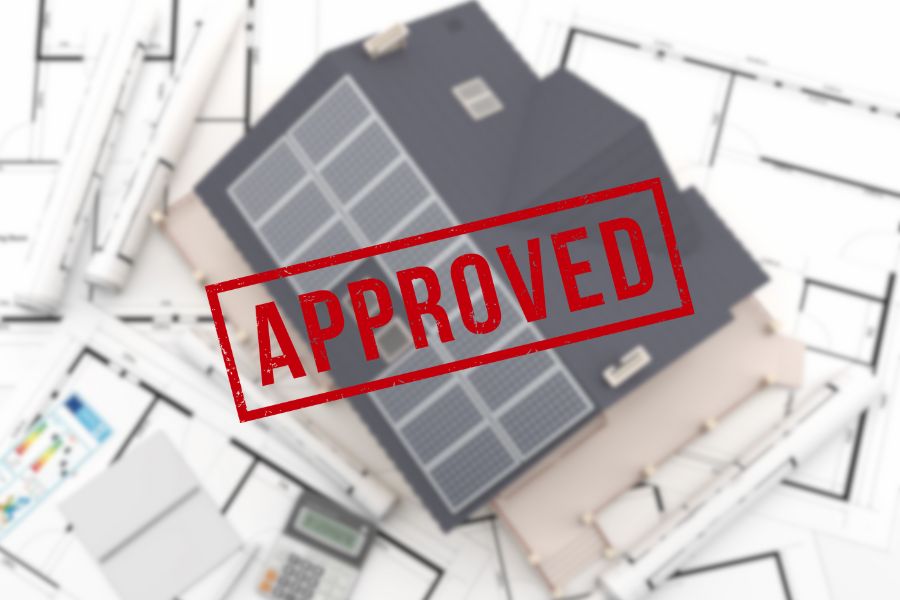
In Ireland, planning permission is not usually required to install rooftop solar panels on buildings or within the enclosed area immediately surrounding a home, also known as the curtilage.
It is under the provision that the panels do not extend above the roofline. Also, their coverage on any roof is 12 square meters or 50% of the entire roof area, whichever is lesser.
These rules fall under the Planning and Development Act, which encourages using renewable energy solutions to help homeowners reduce their energy bills. However, these rules are subject to change and might differ for protected structures or homes in designated areas. Different regulations could apply if you plan a more extensive installation or a ground-mounted system.
Given the complexities of such a project, consulting with a professional solar installation company is always recommended. They will be up-to-date on all the local and national regulations and can guide you through the process to ensure you comply.
Despite the general rule of not requiring planning permission for solar panel installations, verifying the latest regulations with your local planning authority is always wise before proceeding with your installation.
How Can I Get a Solar Panel Installation Grant?
The Sustainable Energy Authority of Ireland provides official information on solar panel grants you may qualify for. Here is a breakdown:
Eligibility Check
First, ensure that you are eligible for the grant. The property must be built and occupied before 2011, and you must be the owner. You will also need to use an SEAI-registered installer.
Choose a Registered Installer
You must use a contractor from SEAI’s registered list to ensure a safe and compliant installation. This installer will guide you through the process, provide a quote, and help you with the application.
Application
The application is usually made online on the SEAI website. You must provide:
- your MPRN number (found on your electricity bill)
- bank details
- the quote from your chosen contractor
Work Commencement
After the issuing of your grant offer, the installation work can commence. One must complete the job within eight months of the date of the grant offer.
Payment
Upon completion, your installer will submit a completion report to SEAI. After review and approval, the grant payment is transferred directly to your bank account.
Can a Normal Electrician Install Solar Panels?
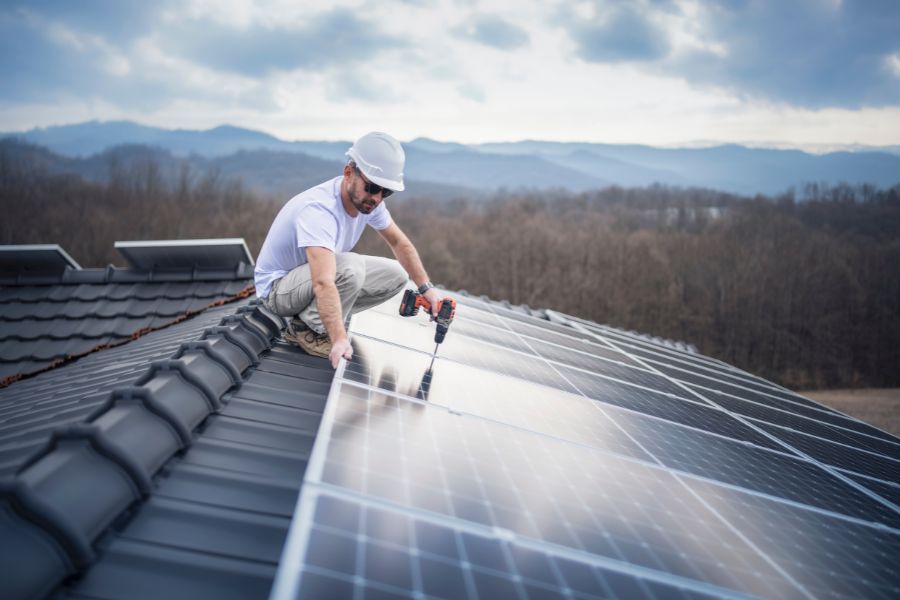
The installation of solar panels involves specific knowledge and expertise that goes beyond the skills of a typical electrician. It requires understanding the design and setup of solar energy systems. That includes solar panel mounting, positioning for optimal sunlight exposure, connection to the inverter, and integration with your home’s electrical system. You may need to consider sustainable development guidelines provided by the Department of Housing when installing your solar panels.
While a general electrician can handle the electrical connections in a solar panel system, they might only be familiar with the specifics of solar installation. That is if they’ve received additional training in this field. Furthermore, this is important because improper installation can reduce system efficiency, potential damage, and safety hazards.
Moreover, in many places, including Ireland, regulations stipulate that certified or qualified professionals must install solar panel systems to meet safety standards. They then qualify for grants or incentives. These professionals have undergone specific training in solar panel installation. Moreover, they know local building codes and regulations related to solar installations.
How Long Does an Average House Solar Panel Installation Take?
The time it takes to install a solar panel system on a residential property can vary significantly depending on the size and complexity of the system, the condition of the roof, and the efficiency of the installation crew. However, on average, the physical installation of solar panels usually takes between 1 to 3 days once all the required permits and equipment are in place.
Conclusion
So, wrapping things up – yes, you can install your solar panels in Ireland, but there’s more to the story. To ensure quality installation and adherence to standards, you might want to engage with SEAI-registered contractors. You’ll need a certified electrician to make the final connections, and going the DIY route might complicate things with warranties and grants. And even though you usually won’t need planning permission for small setups, it’s always best to double-check with the local authorities or a solar company to stay on the right side of regulations.
So, weigh the pros and cons carefully. After all, whether you’re a DIY enthusiast or prefer the pros, switching to solar is an excellent move towards a greener Ireland.
